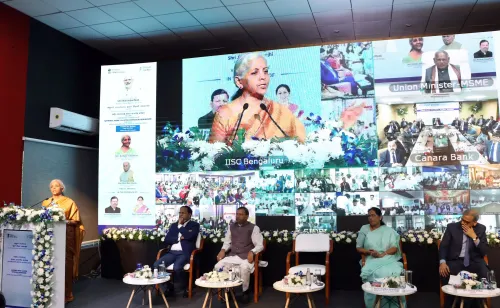Why Do Only 7% of Indian Heirs Feel Obligated to Join Family Businesses?

Synopsis
Key Takeaways
- 7% of heirs feel a duty to join family businesses.
- 88% of entrepreneurs trust the next generation with family wealth.
- Family businesses contribute 79% to India's GDP.
- 45% of entrepreneurs support alternative career choices for their children.
- Projected transfer of wealth in India could reach $1.5 trillion.
New Delhi, May 20 (NationPress) A recent report reveals that even though a majority of Indian business owners have significant confidence in their offspring's ability to manage family assets, only 7 percent of Indian heirs perceive a sense of duty to assume control of the family enterprise.
The report by HSBC Global Private Banking indicates that 88 percent of Indian entrepreneurs trust the next generation to manage family wealth effectively.
Interestingly, 45 percent of these business leaders do not anticipate their children taking over the family business, reflecting a growing acceptance of varied career choices.
Sandeep Batra, Head of International Wealth and Premier Banking at HSBC India, emphasized that family enterprises in India are navigating the balance between tradition and transformation.
He stated, “There is confidence in the next generation to preserve the values of the family business, but open dialogue and well-structured succession planning are essential.”
Family-run businesses are pivotal to India’s economy, accounting for approximately 79 percent of the nation’s GDP, one of the highest ratios globally.
The study revealed that most heirs, particularly in families with multiple generations, feel inspired to pursue their passions.
In fact, 83 percent of participants reported feeling empowered to explore new avenues upon taking over the business.
Nevertheless, the inclination to retain businesses within the family remains robust. Around 79 percent of Indian entrepreneurs expressed intentions to pass their businesses to family members.
This trend aligns with global statistics, such as 77 percent in the UK and 76 percent in Switzerland.
Indian second- and third-generation business owners feel significantly trusted by their predecessors, with 95 percent indicating that they believe their forebears had confidence in them—much higher than the global average of 81 percent.
India is also on the brink of a substantial intergenerational wealth shift. According to Hurun data, by 2024, India is projected to have 334 billionaires in USD, with nearly 70 percent expected to transfer wealth totaling $1.5 trillion—over a third of India’s GDP.
The report further highlighted that many of India’s prominent family businesses were established following the economic liberalization in the 1990s.
The new generation, often educated abroad and raised in urban settings, brings innovative perspectives and is increasingly inclined to pursue independent trajectories.









